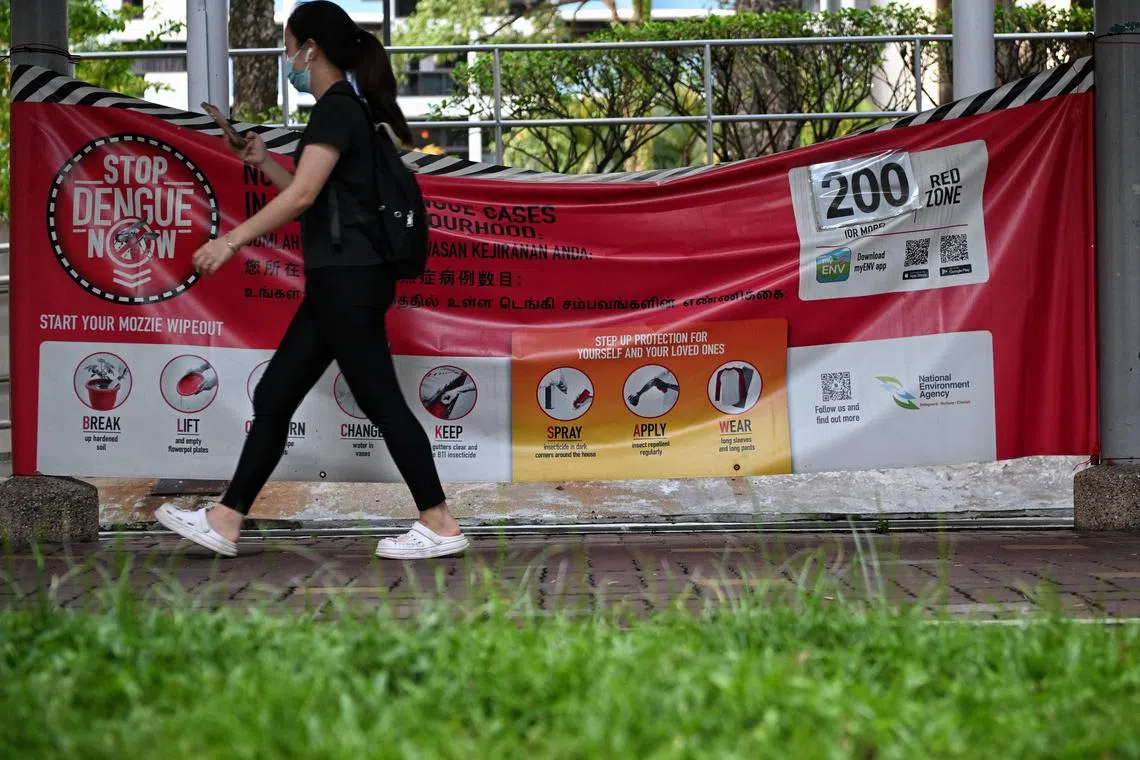NEA warns of dengue surge as strain responsible for outbreak in 2013 resurfaces
Sign up now: Get ST's newsletters delivered to your inbox

The DenV-1 strain has contributed to persistent dengue transmission in some parts of Singapore since June 2023.
ST PHOTO: KUA CHEE SIONG
SINGAPORE – A resurgence of the DenV-1 dengue virus strain,
Noting that the DenV-1 strain has contributed to persistent dengue transmission in some parts of the island since June 2023, the National Environment Agency (NEA) is now warning about a potential surge in dengue cases.
“With the increase in proportion of the previously less prevalent DenV-1, coupled with the high Aedes aegypti mosquito population, we may see sustained high level of dengue transmission towards the end of the year,” NEA told The Sunday Times.
“Warmer weather in the coming months
So far, there have been more than 6,680 dengue cases in 2023. The number is markedly lower than the record-high 35,315 cases seen in 2020 and 32,325 in 2022.
“We observed the resurgence of DenV-1 in the 2013 to 2014 outbreak (22,170 and 18,326 cases, respectively) which was also almost 10 years after the 2004 to 2005 outbreak caused by the same serotype,” said NEA.
Thus, there are concerns that history might repeat itself.
“The last outbreak caused by DenV-1 was about 10 years ago, and the drop in population immunity could be sufficient for it to surge again,” said NEA.
The dominant strains in the past have been DenV-1 and DenV-2, before the rarer DenV-3 serotype became prevalent from late 2021, driving the 2022 outbreak and contributing to cases in the first half of 2023.
However, in July, the proportion of DenV-1 cases was about 55 per cent, significantly more than the proportion of DenV-3 cases (17 per cent).
How the dominant serotype carried by mosquitoes shifts over time depends on three interacting factors: the evolution of the virus within each of the serotypes, human immune response and the Aedes mosquito population, said Professor Hsu Li Yang, an infectious diseases expert at the National University of Singapore’s (NUS) Saw Swee Hock School of Public Health.
“Fitter variants that are better able to infect mosquitoes and humans emerge over time, and also get replaced over time. Because Singapore is a global travel hub, new variants of the dengue virus are repeatedly introduced from overseas,” Prof Hsu said.
Professor Tikki Pangestu, a visiting professor at the NUS Yong Loo Lin School of Medicine, said: “In time, more of the population will develop immunity to DenV-1, but this may take some time. DenV-1 will most likely be the dominant strain for a few years.
“More than likely, yes, we may see an outbreak starting perhaps early next year once again... Every time there is a strain shift, you will most likely have an outbreak.”
Singapore’s largest cluster is currently in Lorong 1 and Lorong 2 Toa Payoh,
Block 149 in Lorong 1 – comprising two-room rental flats – is the second-most heavily hit residential block in the cluster, with 55 cases.
Several residents said many mosquitoes flew into their homes between May and July, which caused a nuisance and disrupted their sleep.
Shutting the windows and doors or wearing long-sleeved shirts and pants was not possible for some due to the hot weather. Mosquito coils, nets and insecticides became essential household items.
NEA said about 290 mosquito breeding habitats have been detected at the large Toa Payoh clusters, with about 66 per cent of these breeding sites found in homes.
The Bishan-Toa Payoh Town Council said its officers have ramped up vector-control measures over the past few months. These include daily inspections to find and destroy potential breeding habitats, daily oiling and desilting of drains, and weekly fogging.
Block 149 resident Siti Nurulhuda, 37, was infected with dengue in April and June. While she had only high fever in April, her symptoms worsened when she was infected a second time.
She suffered frequent bouts of vomiting, diarrhoea, giddiness and a fever exceeding 40 deg C. Her blood pressure and platelet count fell, a key symptom of dengue. The call operator had to be hospitalised for six days at the National Centre for Infectious Diseases.
As there are four virus serotypes (the fourth being DenV-4), a person can be infected with dengue up to four times. Repeated infections in a person increase the risk of severe dengue fever.
Among the 12 existing high-risk clusters, transmission is particularly rapid in the newer clusters of Science Park Drive (79 cases) and Lentor area (50 cases, with the Bullion Park condominium accounting for 33 cases).
Yio Chu Kang MP Yip Hon Weng, who visited residents in Lentor on Saturday morning to distribute insect repellents, reminded them to check for stagnant water at home, apply repellent, and avoid dark corners.



